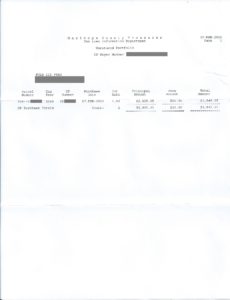by Fred Fuld III
Have you heard about tax liens, especially how you can sometimes get high interest rates or even a house from your investment? Let me tell you how tax lien investments work.
I have gone through the process of looking looking for tax liens, buying, and getting a return.
What Are Tax Liens?
A tax lien is a legal claim placed on a property by the government (usually a county, sometimes cities) when a property owner fails to pay their property taxes. It is essentially a debt owed to the government for the unpaid taxes. The tax lien gives the government the right to collect the owed taxes by selling the property at a tax lien auction.
Tax lien investments, also known as tax lien certificates or tax lien sales, are investment opportunities where individuals or entities can purchase the right to collect the unpaid taxes from the delinquent property owner. When a property owner fails to pay their property taxes, the local government may decide to hold a tax lien auction to sell the tax liens to interested investors.
Here’s how tax lien investments typically work:
- Tax Lien Auction: The local government organizes a tax lien auction, where investors bid on the right to purchase tax liens for specific delinquent properties.
- Interest and Redemption Period: When an investor purchases a tax lien, they are essentially lending money to the property owner to pay off their taxes. In return, the investor receives a certificate indicating the amount of the lien and the interest rate that will be applied if the property owner redeems the lien.
- Redemption: The property owner has a designated period (redemption period) to pay back the delinquent taxes, plus interest and any additional fees or penalties, to the tax lien holder (investor). If the property owner redeems the lien within this period, the investor receives their initial investment plus the accrued interest.
- Property Acquisition: If the property owner fails to redeem the tax lien within the redemption period, the investor may be able to foreclose on the property and become the new owner. However, this process can be complicated and varies depending on local laws and regulations.
Tax lien investments can offer potential benefits, such as higher interest rates compared to traditional investments, and the possibility of acquiring properties at a discount through foreclosure. However, there are also risks involved, such as the property owner’s inability to redeem the tax lien, legal complexities in the foreclosure process, and the potential for properties to have other liens or issues that make them undesirable investments.
When you get the tax lien certificate, don’t expect anything fancy, like a certificate with scrollwork borders and a vintage font.
The following is an example of what I received from Maricopa County in Arizona. (Private information has been greyed out.) It almost looks like it was printed with a dot matrix printer.

Investors can buy the tax lien certificates through county auctions and can earn outrageously high interest rates of potentially 16% to 24% on their tax liens. Plus, bidding can be done all online.
The property owners are required to pay the back taxes plus the interest otherwise they can lose their property to the tax lien owner.
What States Offer Tax Liens?
The states that offer tax liens are as follows:
- Alabama
- Arizona
- Arkansas
- Colorado
- Florida
- Illinois
- Indiana
- Iowa
- Kentucky
- Maryland
- Mississippi
- Missouri
- Montana
- Nebraska
- New Jersey
- New York
- North Dakota
- Ohio
- Oklahoma
- Oregon
- South Carolina
- South Dakota
- Vermont
- West Virginia
- Wyoming.
- District of Columbia
You don’t have to live in a tax lien state in order to buy a tax lien in that particular state, plus you don’t even have to be a United States citizen or resident.
My Tax Lien Experience
The fist thing I did, after discovering that Maricopa County in Arizona was having an auction, was that I began looking though the Tax Lien section of the Maricopa County Treasurer’s Office website.
I then accessed the list of all the tax liens of properties being auctioned off, and started going through it. After being overwhelmed with numerous parcels, I decided to narrow my search, and chose Scottsdale, figuring that I couldn’t go wrong in a high income section of the county.
So I went through every property in Scottsdale, including houses, condos, lots, and raw land. It took a few hours but I did my searching while watching TV.
I looked up literally every one of the properties on Google Maps. Some of the lots turned out to be strange shapes, such as three feet wide by a 50 feet long. Some of the houses had liens that were way above my budget.
Then I came across a great one, a lot in an expensive neighborhood surrounded by million dollar homes, and the tax lien fit my budget of a maximum of ten thousand dollars. Since it was in a nice development, I assumed that it couldn’t be located on top of a toxic waste dump.
On Google Maps in Satellite View, I noticed that the ground had been graded and an indentation for a swimming pool was created, but no structure or even a foundation was on the property.
But then I discovered something else. I found a more up-to-date map on the Maricopa web site (which was hard to find and navigate to at the time) which also had a satellite view. When I checked on that map, it showed that the lot actually had a house on it! Apparently, the Google Maps picture was a bit out of date.
Considering that was a nice bonus, I registered to bid right away and funded my account.
Once all that was completed, I could bid. Now the way the bidding works is what I call reverse-intuitive.
Here is how the bidding process works. You bid on what the lowest interest rate is that you are willing to accept on your tax lien. The bidder who bids the lowest interest rate wins. At the time (this was several years ago), the bidding for this particular county could range from 18% to 4% in one percent intervals. The bidding range has since changed; it’s now 16% down to 0%, the last time I checked.
It was time for me to bid and with a couple weeks to go, I placed a bid of 6%, figuring that would be a nice return if I won.
Then two days before the auction close, I thought that I should lower the bid to 5% as it would give me a better chance of winning, plus 5% was and still is still a great return.
One day before the close of the auction, I changed my mind one more time, since I wanted that property badly.
So I finally changed it to 4%, the lowest bid level available at the time. At that time, I really didn’t care how much or how little the interest rate was, I just wanted to get the tax lien and hope that it never got paid off, so I could take over ownership of the house.
The next day, the auction closed. According to the web site, there were two bidders at 4%, with me being one of them. When there is a tie, a drawing takes place. I’m not sure how the drawing takes place, and didn’t really care at the time, but I won!
It was my lucky day. A few days later, I received the tax lien certificate in the mail. It looked nothing like any certificate I had ever seen. (See above.)
So you’re probably wondering if I got a million dollar mansion for a few thousand dollars.
As it turned out, the lien was paid off. I ended up owning the lien for slightly over a month, but earning three months worth of interest, giving me an effective yield of almost 12%. I’m not going to complain about getting three months of interest. I think it had something to do with the tax lien holding period overlapping three months.
The tax lien investment was practically riskless. It was backed by the value of the property, which was substantial. Not to bad a return for such a short term holding in a very low interest rate environment.
Where to Find More Info about Tax Liens
There are plenty of these tax lien auctions available. There are also plenty of books available about tax liens.
If you are interested in learning more about tax liens, check out some of these books:
Your Great Book Of Tax Liens And Deeds Investing
Understanding Tax Lien and Tax Deed Investing: No Fluff
The Complete Guide to Investing in Real Estate Tax Liens & Deeds: How to Earn High Rates of Return
Zero Risk Real Estate: Creating Wealth Through Tax Liens and Tax Deeds
Profit by Investing in Real Estate Tax Liens: Earn Safe, Secured, and Fixed Returns Every Time
Tax Lien$ for investing in New Jersey tax liens
Where are the Upcoming Tax Liens?
If you are looking for the web sites of the counties, parishes, and cities holding tax lien sales, here is a random sample of some of them with links:
Maricopa County, Arizona
https://treasurer.maricopa.gov/Pages/LoadPage?page=TaxSaleDetails
Yuma County, Arizona
http://www.yumacountyaz.gov/government/treasurer/tax-lien-information
Broward County, Florida
https://lienhub.com/county/broward/certsale/main
Sarasota County, Florida
https://www.sarasotataxcollector.com/services/tax-services/property-tax/tax-cert-sale
Sarasota, Florida
https://sarasotafl.realtaxlien.com
Charleston County, South Carolina
https://www.charlestoncounty.org/departments/delinquent-tax/tax-sale.php
Gwinnett County, Georgia
https://gwinnetttaxcommissioner.publicaccessnow.com/PropertyTax/DelinquentTax/TaxLiensTaxSales.aspx
Fulton County, Georgia
https://www.fultoncountytaxes.org/property-taxes/property-tax-sales.aspx
Baldwin County, Alabama
https://baldwincountyal.gov/government/revenue-commission/tax-lien-auction/lists/tax-lien-auction/191c681f-3e3e-4b00-9e1c-8a4b25f0b06a
Lake County, Indiana
https://lakecounty.in.gov/departments/treasurer-taxsaleinfo
Polk County, Iowa
https://www.polkcountyiowa.gov/treasurer/information-for-tax-sale-buyers/
Jefferson County, Kentucky
http://www.jeffersoncountyclerk.org/delinquenttaxes/
District of Columbia
https://otr.cfo.dc.gov/page/real-property-tax-sale
Baltimore, Maryland
https://www.bidbaltimore.com/main?unique_id=87A77E142A5211E8AB57310613945BAD&use_this=view_faqs
Nassau County, New York
https://www.nassaucountyny.gov/527/Annual-Tax-Lien-Sale
Happy Investing!!!
As an Amazon Associate, earnings may be generated from qualifying purchases of books from affiliate links at no additional cost to you.



